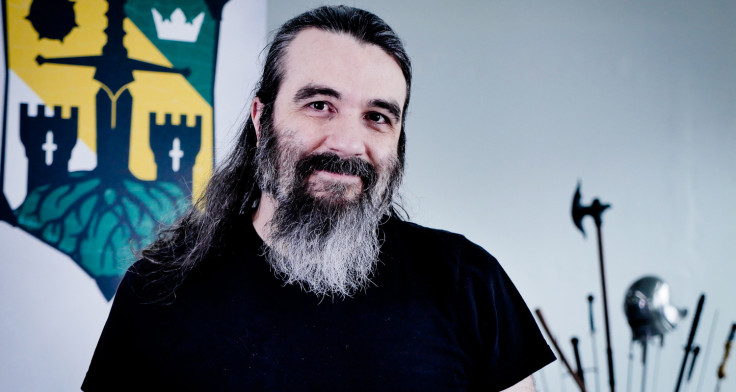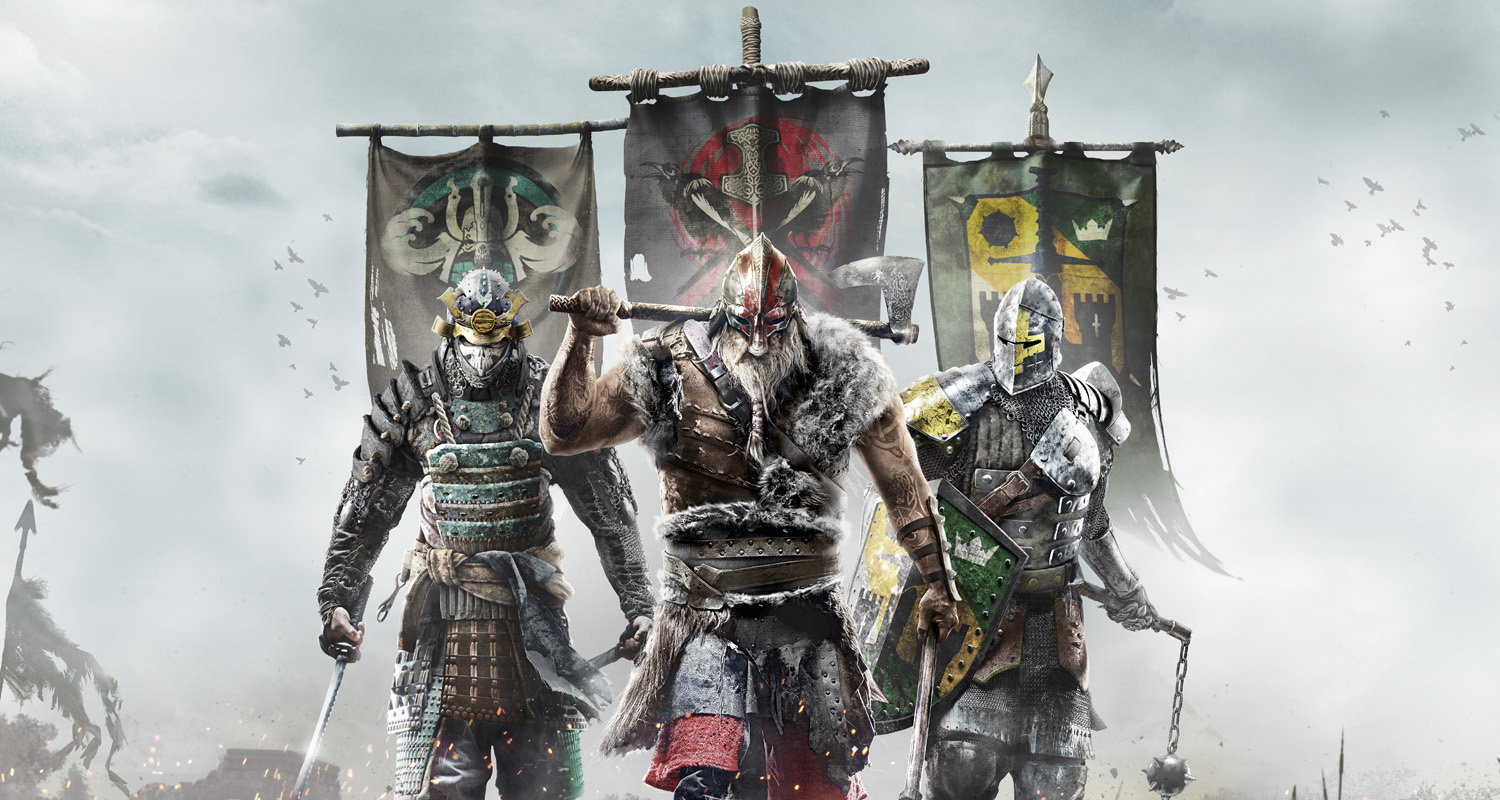For Honor interview: Director Jason VandenBerghe on bringing his 15-year passion to life
Knights, Samurai and Vikings do battle in Ubisoft's anticipated medieval action game.
For Honor is unique in Ubisoft's catalogue: a small-scale, strategic hack-and-slash game set in a world of historical fantasy, envisioning a seemingly-endless war between Knights, Samurai and Vikings.
With gameplay that recreates the methodical combat techniques of each iconic faction of warriors, and puts as much emphasis on defence as attack, this is an action game that requires patience and mastery from its players.
In short, it's not your typical AAA video game release. To discuss the Ubisoft game, its mechanics and the fifteen years it took to make the game a reality, IBTimes UK sat down with its creative director Jason VandenBerghe.
IBTimes UK: What do you think the higher ups at Ubisoft saw in the game when they gave it the green light?
VandenBerghe: When I pitched For Honor, I had taken this course in German long sword and I wanted to capture that feeling of fighting with weapons and put it into a video game because it hadn't been done before, and I had this idea about how I could do it.
My message was that I want our players to feel the way that I feel when I do this for real. I think they saw the potential and that got us the green light.
All along it's been the passion of team and the conviction of the developers that we really knew we were on to something and that it was going to be cool, right? That passion is something that Ubisoft loves. When you've got a group of developers that are really into what they're doing and they're chasing something that is demonstrably fun, it's hard to say no.
The game is more strategic than many expected after the reveal. What has it been like watching people approach the game expecting one thing then learning what it really is?
Stunning actually, it's beautiful. It's really exciting that's happening because to us that's always been the pitch and it's hard to explain to people, because what's the genre? What do I call it? I keep hoping that the press and the players will tell us what the genre is, right? It would be great to know. We always knew that if it was going to work, it was going to work when you picked up the controller and tried it.

For Honor's combat will inevitably draw comparisons to Dark Souls. To what extent was the game a source of inspiration and where does your game differentiate itself?
This idea came about 15 years ago, long before Souls came out. The essential idea really was inspired by fighting itself and then, sort of, the state of fighting games. But all throughout the development and years prior to that I've been playing every game possible. Dark Souls is an amazing series right? It's one of my favourites.
I wanted to stay focused on our warrior's fantasy and that big battlefield action. So wherever we could we would draw inspirations sort of mechanically for individual pieces but there was never a game that was really like the guiding inspiration for us because the game is so unlike any other game that we didn't have that, which is both a benefit and a problem.
You said the idea of this came out 15 years ago. Why did it so long to get the game made?
I took a course in German long sword. Well, I'm that guy right? The idea came out of looking at that system and the simplicity of that system and saying, what if we took that and we applied it to the right stick of the controller? I got excited about that idea and I sort of pitched over the course of 10 years.
Remember though, that was a long time ago, it was before Game of Thrones it was before Dark Souls, it was before Skyrim, it was sort of in the Lord of the Rings era and so it was a different time that I was pitching, and I just wasn't that good at pitching. Also, knowing what I know now, we wouldn't have been able to do it. It required a bunch of new technologies that we didn't have available to us at the time, and I didn't know that at the time. Maybe some of the people I was pitching to did.
I think it's a combination of things, like, the market has shifted right? What was not cool then is cool now and then the idea had become more feasible. I found a team that had the expertise and a lot of the tact that was needed to make it work, and I just also stopped sucking at pitching!


How did the team go about doing research for the game?
First, a lot of weapon fighters joined the team because they were interested in the concept. You'd be surprised how many weapon fighters there are in game development, it's funny. So, we had sort of a core, then we would do things like bringing in real fighters who had experience in show-fighting or even just hobby fighters who knew about armour. We would bring in martial artists, trainers, stunt people and historians and we would just have conversations and have them train us about each of these weapon styles so that we learned practically how they're supposed to work before we converted them into game design.
We also did things like, we would have events where we would take a team and go out to lunch, rent a room at the YMCA where we would have a bunch of these foam weapons. And we would just go through the act of fighting it out because there's nothing better to teach you what matters in combat than being in combat, right?
How have you balanced the game's combat so it doesn't put off a mass audience? It's not exactly a game you can button-mash in.
Yeah, so, it's great to hear you say that because the goal is exactly that. The answer is iteration. When we began the project we had like, 20 people working on the game, this core group and we made something like 200 prototypes in the course of 18 months. Sometimes we had two versions of the game per day. We were doing daily play tests and we just tried everything, or we would just go down every design route we could think of. We were really honest with each other about whether it was working or not. There was no room for preciousness on the team.
It was really like: 'Is this fun, yes or no and why?' and we would discuss it and then we would rip out the stuff that didn't work and put in stuff that did. It was a very sort of egalitarian conversation. As a result, we ended up with the system that we've got. So, I think that it was a result of that process. It was incredible... an incredible experience. You don't get to do that very often, right? Don't get to burn on prototypes for, you know, that long with full support of the company. We incredibly lucky to have that chance.


Those in the closed beta will have got a taste of the game's multiplayer metagame, can you explain how this will work?
The Faction War. This was a weird ambition I had from the beginning, which was that I wanted to have an experience where every action that I was taking, that every player in the game was playing some metagame with me. That we were all involved on some sort of combined board, right? That it was straightforward and simple enough that it wasn't just for the people who were totally into it. That was always the goal, that we would all be participating in kind of this mass war.
So we ended up with a Faction War - you choose Knight, Viking or Samurai as your allegiance, and then every mission, every match that you play in a multiplayer game and in fact, when you play in a single player you'll see that some of the War Assets even come through from there. You earn War Assets by playing the game and when you complete your round you can choose where to place these assets along the map's battlefront.
The game is played over a series of rounds and at the end of each round the team that controls the most territory wins the round and then over the season the team that wins most rounds wins the war and we divide the rewards based on that. The idea is it's just a very simple sort of strategic game that lets people coordinate as a faction to make decisions.
At the end of the season, whatever has happened will become part of the permanent lore. That will be the official history of the game. The story campaign is played in the past and multiplayer is effectively the present, so what you're playing in the multiplayer game is the current history of the For Honor world.


What can players expect from For Honor's single player?
So, in the single player you'll be playing as the Knights and then the Vikings and Samurai in three chapters of the story. The story revolves around the warlord Apollyon who's our villain and she makes no bones about that. Apollyon thinks that humans are divided into predators and prey and that we have a moral obligation to allow the predators free rein to prey on their food basically. She is setting out to set the world up in accordance with that vision.
You're going to play... a series of, sort of, handcrafted over-the-top missions that are going to give you a chance to dig into the lore, settle into the universe and get an idea of what it means to be fighting for each of these factions and what their culture is like and who they are.
Why did you go with Knights, Vikings and Samurai, and have you discussed perhaps expanding For Honor with further factions?
There were all these possibilities we could do but, the Knights, Viking, Samurai question is such a great conversation starter for this, because it's not a question about skin it's a question about value I think. It asks you what kind of warrior you might be and I love it for that perspective.
Even if we did add other stuff in the future they would fit underneath the same three [factions]. One of the things I love about it is if I say Knights, Vikings, Samurai, people know the answer... it's weird.
Knights represent, I think the protector belief right? It's a reason to fight. People who believe in protecting the weak and standing in the way of harm, right? Sort of, defending the defenceless. People who choose Vikings they tend to believe in passion and living life to the full, sort of the fearlessness. Then some people who choose Samurai tend to believe in mastery, in the devotion and devotion to perfection knowing that you can't achieve it.
Those are, I think those are the three great reasons to fight which is why we ended up with them. I should say, I think that's why Knights, Vikings and Samurai live inside our culture as the three great warrior archetypes that we argue about right? The discussion is about values not about culture.
For all the latest video game news follow us on Twitter @IBTGamesUK
© Copyright IBTimes 2025. All rights reserved.



















